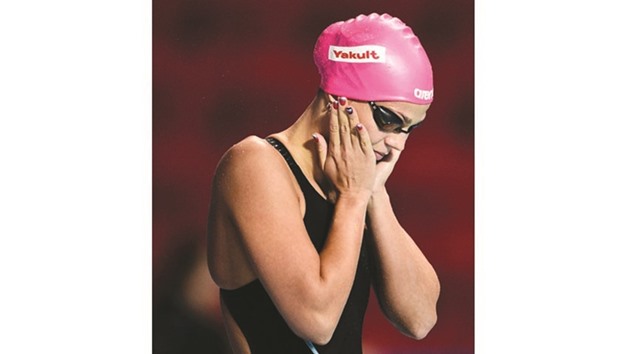Russia breathed a sigh of relief after the IOC declined to impose a blanket ban on its competitors at the Rio Games over state-run doping, but the decision met fierce criticism elsewhere with Olympic chiefs branded ‘spineless’.
In one of the most momentous moves in its long, chequered history, the International Olympic Committee said on Sunday it was up to each international sports federation to decide if Russians could take part in Rio.
Swimming’s world governing body FINA yesterday announced a ban on seven Russian swimmers from competing in Rio, making it the first international federation to impose sanctions in light of Sunday’s IOC decision. Vladimir Morozov and Nikita Lobintsev, both 4x100m freestyle bronze-medal winners with the Russian team at the 2012 Olympics, and Yulia Efimova, another 2012 Olympic bronze medallist, were among the seven banned.
Four-times breaststroke world champion Efimova's agent said she will appeal to the Court of Arbitration for Sport. "We've taken the decision to appeal to CAS. The opponent will be the International olympic Committee, FINA and the Russian olympic Committee," Efimova's agent Andrei Mitkov told R-Sport.
Efimova, who trains with the University of Southern California in Los Angeles, was disqualified from competing by FINA between October, 2013 and February, 2015 after testing positive for traces of the anabolic steroid DHEA.
The 2012 olympic bronze medallist, in the 200m breaststroke, returned from her ban last year and won 100m gold at the world championships in Kazan, Russia, in August as well as a 50m bronze. The 24-year-old also tested positive for Meldonium this year but FINA dropped charges against her earlier in July and said she was free to compete. The possibility of Efimova competing in the Rio olympics was already a major talking point in the sport.
Lithuania's olympic 100 metres breaststroke champion Ruta Meilutyte said last year, after being beaten by Efimova at the world championships, that she could not see the Russian as 'a true honest competitor any more'.
Other international federations now face a race against the clock with the opening ceremony only 11 days away, global sport sharply divided and some Russian competitors already in Brazil. Kremlin spokesman Dmitry Peskov called the IOC decision ‘positive’.
“We welcome the main decision, which allows so-called clean athletes to take part in the Olympic Games,” Peskov told reporters. Russian sport and the Kremlin have been rocked by doping scandals that saw its track and field team banned from competition, including Rio, and sparked calls led by the World Anti-Doping Agency (WADA) for all Russians to be barred until they cleaned up.
Dmitry Svishchev, who heads the lower house of Russian parliament’s sports and physical culture committee, told AFP the IOC decision was ‘not bad’. But he railed against the fact that Russian athletes who served doping bans in the past would be barred from Rio under the new IOC criteria, especially when drug cheats from other countries who had served their suspensions were allowed to go. “You can’t punish twice for the same thing,” Svishchev said.
Russia’s gymnastics team — the first group of Russian athletes to arrive in Rio — are already training in Brazil, coach Valentina Rodionenko told
R-Sport news agency, saying that ‘the worst is behind us’.
Most Russian competitors will fly out on Thursday, R-Sport reported, although it remains to be seen how many will actually take part in the Games.
Russia’s reaction was in stark contrast to much of the rest of the world. Olympic chiefs had been under pressure — and with time running out before Rio — to hit Russia with the hardest sanctions possible to punish state-run doping that was laid bare in a WADA-commissioned report a week ago by Canadian law professor Richard McLaren.
It revealed wide-ranging Russian doping in Olympic events from 2011 and including the Sochi Games in 2014, where the secret service used a hole drilled in a wall to swap the dirty samples of doping competitors for clean ones, under the noses of international observers.
Four-time Olympic rowing champion Matthew Pinsent led a cacophony of British condemnation. “IOC has passed the buck — pure and simple,” wrote the 45-year-old Pinsent in The Times.
Defending Olympic long jump champion Greg Rutherford also weighed in. “(The IOC’s decision) is a spineless attempt to appear as the nice guy to both sides,” the 29-year-old told the
Guardian newspaper.
The Australian government warned that a ‘suspicion of compromised integrity’ now hung over the Games and New Zealand’s anti-doping body lamented ‘a black day for clean athletes’.
That came after WADA president Craig Reedie said: “The McLaren report exposed, beyond a reasonable doubt, a state-run doping programme in Russia that seriously undermines the principles of clean sport embodied within the World Anti-Doping Code.” US anti-doping chiefs blasted the IOC for creating ‘a confusing mess’.
Thomas Bach, the IOC president, said the Olympic body had faced an extremely difficult decision and had to ‘find the balance between the overall responsibility (of Russia) and the rights of each individual athlete’.
“The decision will certainly not appeal to everyone, but it comes down to justice,” Bach said in the immediate aftermath on Sunday. The focus will now be on the Olympic sports to let in Russians who they believe are drug-free.
Zhukov said that weightlifters Anastasia Romanova and Tatiana Kashirina — who won silver at the 2012 Games — and freestyle wrestler Viktor Lebedev would not compete in Rio in light of the IOC’s criteria. The World Archery Federation declared that three Russians who had never tested positive for banned substances would be allowed to compete. Russia’s fencing and pentathlon federations have expressed confidence that Russian athletes in their respective sports will also take part, but were still awaiting official confirmation from the respective federations.

Seven Russian swimmers, including four-times breaststroke world champion Yulia Efimova, are ineligible to compete in the Rio olympics, world swimming's governing body said yesterday.
